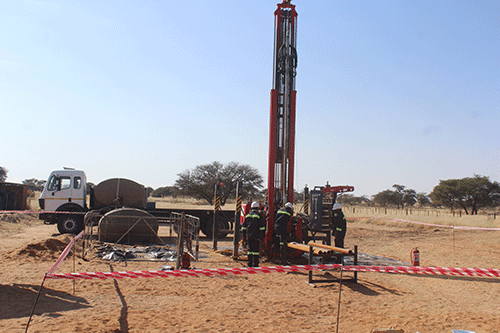Two key ministries, that of mines and energy as well as agriculture, water and land reform, have pronounced themselves on uranium exploration in the Omaheke region, stating they are committed to monitoring and being decisive to ensure uranium exploration in the region is safe.
This commitment came as agriculture ministry spokesperson Jona Musheko confirmed that Uranium One Group, looking for commercial uranium deposits, has indeed applied for a borehole-drilling permit.
Musheko noted that given the history of non-compliance from the company, the line ministry is looking forward to setting adherence measures upon issuing the permit.
Last week in the National Assembly, mines minister Tom Alweendo stated that Uranium One Group’s drilling of boreholes is at a halt, as the company is awaiting a new permit.
He added Uranium Group is not currently drilling because the first water drilling permit lapsed.
“We are going to continue monitoring to make sure the company does what is expected as per the permits issued – that is if they are going to be issued. But currently, they are not drilling. We are equally concerned because if they do that without water management (processes), it may contaminate the underground water,” Alweendo cautioned.
Earlier this year, during a familiarisation tour at farm Tripoli, where explorations are taking place, deputy mines minister Kornelia Shilunga urged the public to put trust in government, saying all steps had been followed, and government is there to serve and not damage communities.
Lack of knowledge
In a letter seen by New Era, the Ovaherero Traditional Authority (OTA) from Aminuis revoked the approval it earlier permitted for uranium exploration to happen in its constituency.
Senior traditional councillor in OTA Friedrich Koujo said: “Our communication of 10 March 2021 has reference. In that communication, OTA had minimum knowledge of uranium exploration and mining. It was to our knowledge that it was only exploration activities that were going to take place, and, on that basis, OTA gave
support”.
Koujo said they observed an environmental clearance certificate (ECC) was obtained without proper and transparent consultation with interested and affected parties.
“It has also come to light that the mining method proposed of in-situ leaching of uranium could pose a serious threat to groundwater in the Stampriet Aquifer, the only source of water in the Aminuis area,” Koujo added.
He further stated the disposal of low-level radiation waste from mining has not been clarified – and with all these risks, the OTA requested the agriculture ministry to pronounce itself on this matter. Now, with the borehole drilling application confirmed as ‘pending’, the authority revoked support for the project.
LPM threatens legal action
On Monday this week, Landless Peoples Movement’s (LPM’s) human rights leader Joyce Muzengua called for the cancellation of the exploration and prospecting clearance certificates with immediate effect.
“After thorough consultations with the communities that inhabit the land that lies on the aquifer, we resolved that the matter will be taken to court should the revocation of these EPLs (exploration and prospecting licences) not take place,” said Muzengua.
Uranium One Group’s stance
Meanwhile, Uranium One’s proposed extraction method, known as in-situ leaching (ISL), is widely used in countries like Kazakhstan, the world’s largest uranium-producing country.
The majority of the mines in Kazakhstan use ISL techniques with sulfuric acid to dissolve the uranium, as New Era and other Namibian journalists discovered last week during a visit to that country. Uranium One spokesperson Riaan van Rooyen explained the ISL method is environmentally friendly and cost-effective, compared to other mining methods.
– mndjavera@nepc.com.na


